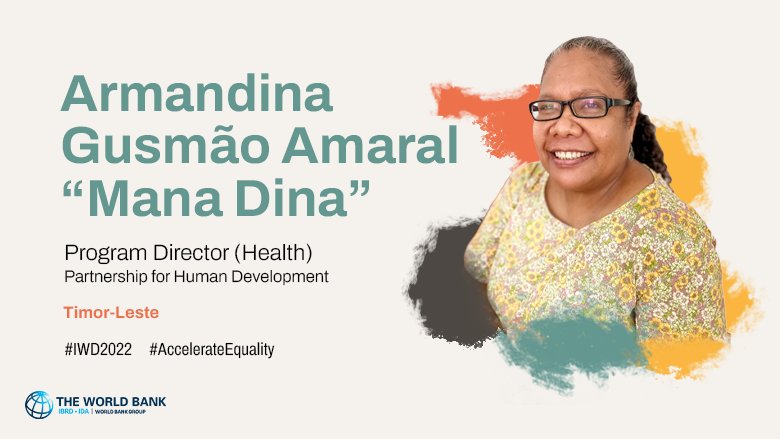My father wanted me to be a nurse, just like him, but I have a different passion for language and management. Somehow, my career path has always involved working in the health sector, initially with Médecins Sans Frontières (Doctors Without Borders) during the emergency time in Timor-Leste; then with UNICEF, Australian Aid and now as a senior Health program director. I would say, his passion runs in me, together with my two sisters who are nurses, helping people through working in the area of health.
Indeed, maternal and child health in Timor-Leste remains a challenge, so does everyone’s health. I work closely with the Ministry of Health to ensure that development aid goes to where it is needed and is helping to make positive changes to people’s lives. This is not a straightforward business, like buying first aid kits and or medicines and distributing it to all Timor-Leste’s families.
While I don’t get my hands dirty and stand in the frontlines like most health workers, knowing that my work in coordination, engagement and management has resulted in something meaningful, has always given me that feeling of ‘butterflies in my stomach’ and an immediate sense that my parents and grandma would be proud of me, and my children will be looking up to me and see what I did.
When I am at work, I think about the people in my childhood village of Soibada and of other people living in rural areas of Timor-Leste and I know that our work is helping to provide safe and quality services from health providers trained by our program, the ambulances that we have fixed, the equipment that we have provided and the and family planning services that we support with the Ministry of Health.
This year's theme is 'Equality today for a sustainable tomorrow'. What can we do better to improve or accelerate gender equality?
Gender equality is very important. It can be as simple as agreeing that we are human beings and should be kind to one another and our surroundings. I think it should start with ourselves and from home, from how we should learn to respect each other, no matter what one’s gender is.
We must help change some of the old perceptions within our society, such as “women should stay at home, women should do the cooking and cleaning, women should be quiet when men are talking.” We’d need to think through what our immediate opportunities are and what we can work on now to see change in the future.
Some of our immediate opportunities could be to help each other to see what is best in ourselves and to make sure that no one feel vulnerable around us: women, men, young people, old people, people with disabilities, LGBTQI, etc. This will hopefully make sure that we do not see someone as different.
In my opinion, anyone can be a leader, if they are genuinely willing to listen, learn, serve, take a risk, reflect, and improve. We want everyone who is eligible, to benefit from leadership opportunities. I want eligible women to become leaders, and unqualified, under-performing male leaders to be kicked out of their roles. Many male leaders are also supported by their female mother, mother-in-law, wife, daughters, and sisters.
I think about my mother and my grandmother’s leadership of our home, and in supporting my father’s professional career. These are two women, whom I think are very emotionally stable and spiritually very strong. I am glad they have passed this on to us, their children, and grandchildren. It is now our duty, to pass on to our children, as much as we can.
I enjoy knowing that I am doing something at work that will make a better, healthier country for my children, my nieces, nephews, and their friends. The opportunity to continue to learn from inspiring male and female leaders and staff from different national or international institutions; and to contribute to the collective efforts of tackling the everyday complexities and to bring positive changes to our lovely Timor-Leste and its people at the end of the day. It can be wearing but an exciting journey still for me.
As a matter of fact, I am still taking advice and learning from my two teenage daughters and son. If I am to advise, young women who aspire to be leaders, I would encourage them to learn - not just from books and at schools, but from your surroundings and know your qualities. Try to be excellent in whatever positions or roles you have. Look after your sexual and reproductive health, maintain a healthy relationship, do not rush but be strong, and know your values and focus on the positive impact of every decision you make.
**The views expressed in this interview do not necessarily represent the views of the World Bank Group.

